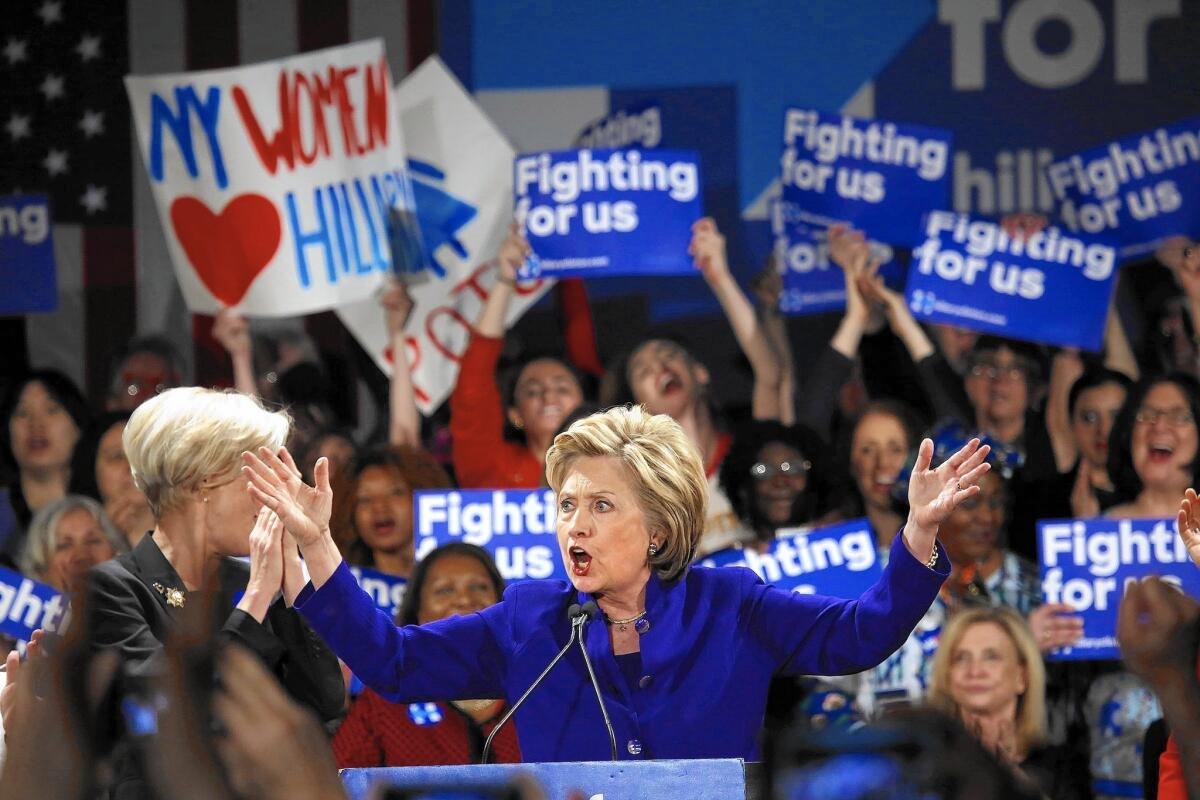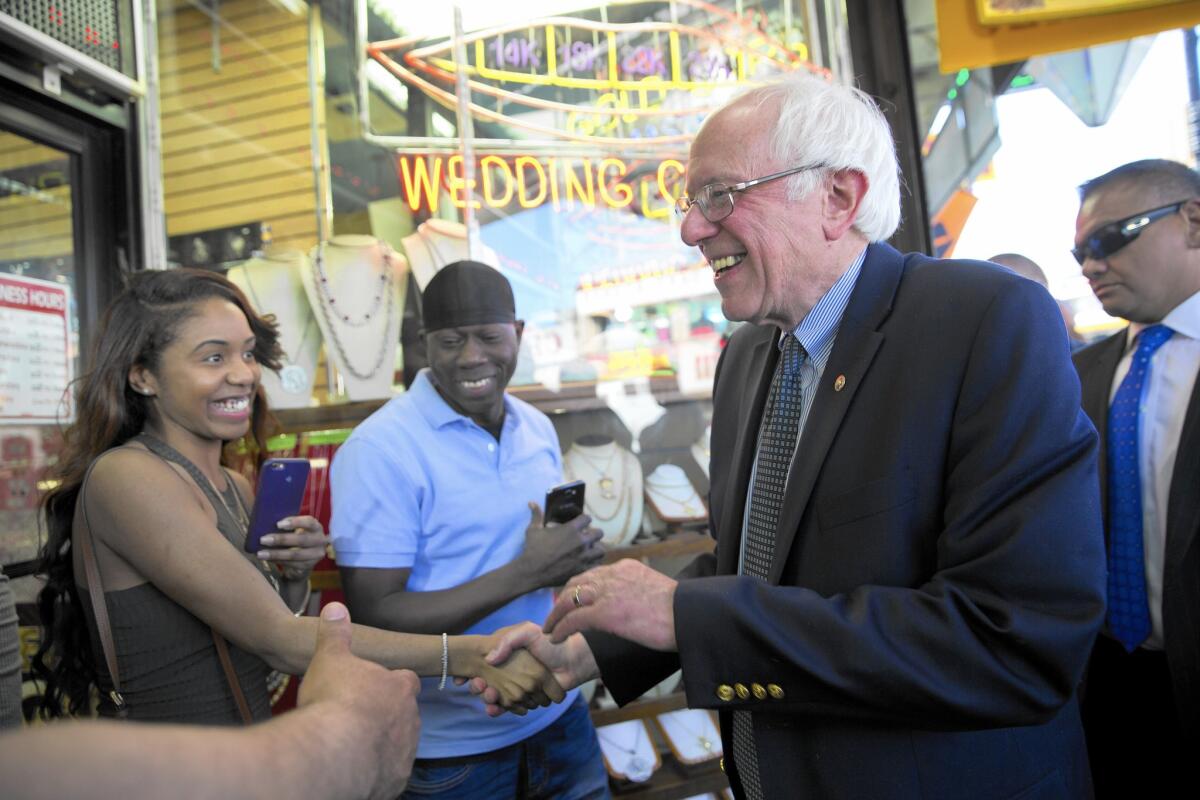Why young voters are flocking to Sanders and older ones to Clinton

Hillary Clinton campaigns in New York. Among likely New York Democratic voters older than 45, Clinton beats Bernie Sanders by 38 percentage points, one poll said.
- Share via
Reporting from New York — At Bernie Sanders’ rally in Brooklyn’s Prospect Park, thousands of supporters, most of them young, gathered Sunday for what seemed more like a concert than a campaign stop. On Monday, Hillary Clinton brought her supporters together in a midtown Manhattan hotel where there was one distinct difference besides the absence of a band named Grizzly Bear: the age of many of those in attendance.
As the two Democrats seek their party’s nomination, Sanders’ appeal is greatest to the young, particularly young men. Clinton’s support is strongest among older voters, both men and women. It has been true through the primary states so far, it’s true in polls leading up to Tuesday’s contest in New York, and it’s true in polls of California, where the 2016 primary season will reach its climactic conclusion on June 7.
Angelica Collado, a Queens College student, was among the sea of Sanders supporters and curious Brooklynites who showed up at the park Sunday, like so many have before at other mass rallies for the Vermont senator. She likes Sanders for his support of free college tuition for state universities and colleges, she said.
“I really like his point of view,” said Collado, 25. “And I think he’ll continue what Obama has really started.”
A day later in Manhattan, Dany Johnson was even more enthused about voting for Clinton.
“I love her experience, her intellect, her energy,” said Johnson, 58. “And the fact that she can take so much crap and come back.”
The schism between those views illustrated what has been perhaps the most persistent aspect of the Democratic presidential contest: most younger voters going to Sanders, in large part because they are drawn to his uncompromisingly liberal ideology, and most older voters going to Clinton because of her determination and deep experience in politics.
“The age factor seems to trump everything,” said Lee Miringoff, director of the Marist College Institute for Public Opinion. “Age is a big deal in all of this.”
In an NBC/Wall Street Journal/Marist poll of likely New York Democratic voters released Friday, Sanders won by 13 percentage points among those younger than 45, while Clinton won by 38 percentage points among those older than 45. The real Sanders edge came among voters younger than 30, who gave him a 53-point advantage.
The numbers were similar in a USC Dornsife/Los Angeles Times poll of California primary voters last month: Sanders led by 47 points among those younger than 30 and 15 points among those younger than 50; Clinton led by 33 points among those 50 and older.

Bernie Sanders campaigns in the Bronx. In a poll of likely New York Democratic voters released Friday, Sanders was ahead of Hillary Clinton by 13 percentage points among those younger than 45.
Nationally, an NBC News/Wall Street Journal poll released Monday showed Clinton and Sanders essentially tied, with 50% for the former U.S. senator and 48% for the Vermont senator. When the poll was divided by age, however, each could claim a giant victory. Among voters 50 and older, Clinton led by 27 points. Among those younger than 50, Sanders won by 31 points.
Sanders has been an unlikely recipient of the affections of the young. They have treated the rumpled veteran politician with a head of unruly white hair as the epitome of hip.
But politics are more than skin-deep, and his liberal political views dovetail nicely with the desires of younger voters.
Voters younger than 30 in California were almost twice as likely as those 65 and older to reside on the left end of the political spectrum. Two in five California voters younger than 30 described themselves as liberal. Only about a quarter of those 50 and older said they were liberal.
Among those 29 and younger in California who planned to vote in the Democratic primary, 71% sided with Sanders, compared with 24% for Clinton. Among Democratic primary voters older than 50, Clinton had a 33-point advantage.
The fact that age and ideology is driving a challenge to the establishment front-runner is not a new development for Democrats. Candidates on the left have fought repeatedly to pull the party in a more liberal direction. Among them were former Vermont Gov. Howard Dean in 2004, former New Jersey Sen. Bill Bradley in 2000 and California Gov. Jerry Brown in 1992. Their respective establishment candidates — John F. Kerry, Al Gore and Bill Clinton — persevered to become the nominees.
The timing of this election, amid a rocky recovery from an economic crisis that began on Wall Street, also plays a role. The younger generation of voters has come of age loaded with college debt and struggling to find jobs. They also have spent a lifetime listening to criticism of Clinton by Republicans. In 2008, they were firmly in the camp of Barack Obama, who defeated Clinton to win the Democratic nomination and, eventually, the White House.
Sanders’ castigation of Clinton as a partner in a corrupt political system and beholden to the Wall Street firms that contributed to a ruinous economy also feeds a discomfort with Clinton.
Some younger voters also just feel more affinity to Sanders.
Courtney Fowlkes, 34, described herself at the Prospect Park event as “definitely” voting for Sanders in the first New York primary in which she’ll take part.
Fowlkes called Sanders a candidate who is “more committed” to her politics.
“I was torn. I did want to vote for the first woman,” she said. “But I didn’t want to vote for a woman because she was a woman.”
She watched the candidates debate and investigated their positions on a website that uses policy positions to tell voters which candidates most closely match their views. She found that she was 96% in line with Sanders and 80% aligned with Clinton.
“The math showed which way to go,” she said.
Clinton, with her vows of compromise and working within the system, may be a less compelling presence for many younger voters. But those traits — and her lengthy political resume — make supporting her a more satisfying choice for many older voters.
Brenda Berkman attended Clinton’s event Monday wearing a campaign cap that dated to the former New York senator’s 2008 bid.
In 1982, Berkman was the named plaintiff in a class-action lawsuit that forced the city’s Fire Department to accept women for the first time. She retired in 2006 after 25 years of service. In Clinton, she sees a familiar persistence and willingness to fight for others.
“Hillary, for her whole career, she has been out there in front, speaking out on a whole variety of civil rights issues,” said Berkman, 64. “She didn’t just poof out of nowhere.”
Berkman was in college during the Vietnam War, when the Democratic Party was roiled between establishment candidates and liberal challengers. And she has great sympathy for young Sanders voters who are loaded with college debt and face difficult job prospects — although, she noted, there are young Hillary supporters as well. Her problem is with Sanders.
“Where’s Bernie been?” she asked. “He’s been nowhere.”
Clinton has held a steady lead in New York, where her status from winning two Senate races and her power campaigning across the state in the last several weeks have solidified her vote. The age split, though notable, does not seems to be hugely troubling her campaign here.
In California, however, Clinton’s edge has been shrinking, and much of that is due to the influence of age.
Clinton has counted on securing her victory in California by holding on to her strong advantages among minority voters, as well as among women. But minorities are showing signs of splitting along the age demarcation.
Among Latino voters younger than 50, Sanders led by 9 points in April, for example; among Latinos older than 50, Clinton led by 50 points. In the seven weeks to go before California votes, voters on both sides of the divide will be in Sanders’ and Clinton’s sights.
Twitter: @cathleendecker
MORE
Are you an independent voter? You aren’t if you checked this box
Sanders’ supporters are lashing out, but here’s how they might be hurting his campaign
Trump is poised to win New York, but by how much matters a lot to delegate-hungry Cruz and Kasich
More to Read
Get the L.A. Times Politics newsletter
Deeply reported insights into legislation, politics and policy from Sacramento, Washington and beyond. In your inbox twice per week.
You may occasionally receive promotional content from the Los Angeles Times.








